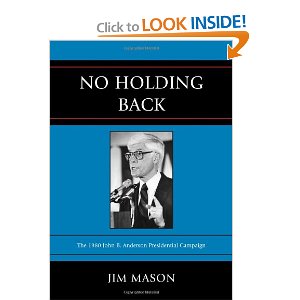Mason’s account of the campaign illustrates why non-major party candidates cannot win. Anderson’s staff spent much of its time doing the kinds of things that major party candidates take for granted: getting voters to sign petitions to get on state ballots, qualifying for matching funds and even bank loans, receiving media attention, etc. This was time and money that could have gone into efforts that would have increased the number of voters informed about the candidacy.
The Anderson “National Unity” campaign, as noted by Mason, paved the way for future independent and third party candidates. He achieved ballot status on all fifty state ballots plus the District of Columbia, which undoubtedly helped Ross Perot with his campaign of 1992. He received enough support in the polls to be included in a national debate with one of the major party candidates in September 1980 (which also assisted Perot ’92). He received several endorsements from some in a skeptical media.
But the Anderson legacy goes far beyond these matters. Anderson made the voters question what candidates tell them. He correctly predicted, for example, that Candidate Reagan’s budget would not be balanced by President Reagan because it asked for no sacrifices by the public. Reagan had attacked Anderson’s own budget for supporting some higher taxes. This willingness to say what voters do not want to hear earned him the reputation as a candidate who distinguished himself from others.
Voters still naturally resist talk of sacrifice and may not follow details they are offered. They may decry the Democratic and Republican ideas as “politics as usual” but vote for the candidates who espouse them, anyway. And they usually ignore candidates on ballots without an “R” or a “D” behind their name.
Anderson raised the voice of independents and made it count. Not in the way of electoral votes but in the way of presenting a candidacy as a credible alternative to the major party candidates. If we ever break the deadlock of voting for what we want to hear, we must remember his legacy of telling it like it really is.
Voters of all political backgrounds will enjoy Mason’s most definitive account of a landmark campaign.
Dean T. Hartwell
Author, Truth Matters: How the Voters Can Take Back Their Nation

 RSS Feed
RSS Feed
